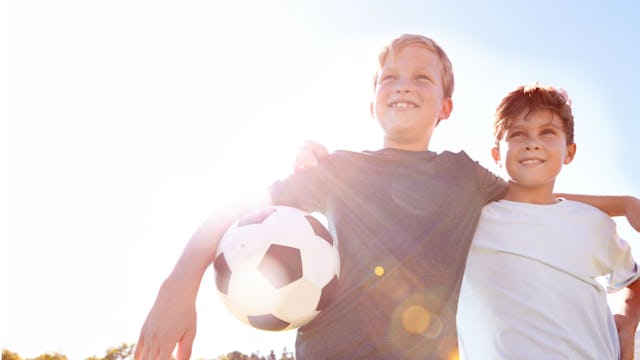Younger Siblings Do More Than Just Hog All The Attention -- They Teach Empathy

A new study about empathy finally confirms that younger siblings are more than just spoiled babies
Take heart, parents of more than one child. In between the endless fighting over toys and your attention, a new study confirms that your kids are actually teaching each other an important lesson: empathy.
The study, published last month in the journal Child Development, looked at how having a sibling impacts kids’ development of empathy. And while you might expect that older siblings would be the ones to teach their younger siblings, the study found that empathy development actually goes both ways.
Having a younger sibling teaches older siblings empathy — proving that younger kids are more than just attention hogs who set out to make their older siblings miserable.
“Although it’s assumed that older siblings and parents are the primary socializing influences on younger siblings’ development, but not vice versa, we found that both younger and older siblings positively contributed to each other’s empathy over time,” said study coauthor Marc Jambon, a postdoctoral fellow at the University of Toronto, in a statement.
So no matter how much your older kids complain about their younger siblings, you did them a favor by gifting them with an annoying little brother or sister. YOU’RE WELCOME, KIDS!
This is the first time a study has found a measurable impact on older siblings by their younger siblings. Previous studies focused on older kids’ influence on younger siblings (because, as every younger sibling knows, older siblings always get all the credit). Those studies found that older siblings influence their younger siblings in broad-ranging ways such as their motor development and whether they’ll start smoking as adults. But studies examining younger siblings’ influence on their older siblings have been less conclusive.
This new study recruited 452 Canadian families with diverse demographics and siblings between the ages of 18 months and four years. Researchers established the older sibling’s baseline levels of empathy by pretending to break a favorite item or hurt themselves and then recording the results. (Sorry kids, it was for science.)
Eighteen months later, they returned and measured the kids’ empathy levels again. And even after controlling for variables like parenting style and sibling relationship quality, researchers still found small but significant increases in empathy.
“These findings stayed the same, even after taking into consideration each child’s earlier levels of empathy and factors that siblings in a family share – such as parenting practices or the family’s socioeconomic status – that could explain similarities between them,” Jambon said.
But before you pat yourself on the back too much for having the foresight to have more than one child, there’s one sibling pairing that didn’t show increased levels of empathy: older sisters with younger brothers. Study researchers don’t know why this one pairing doesn’t show the same positive results, but big sisters with little brothers could probably explain it.
Those little brothers really are just that annoying.